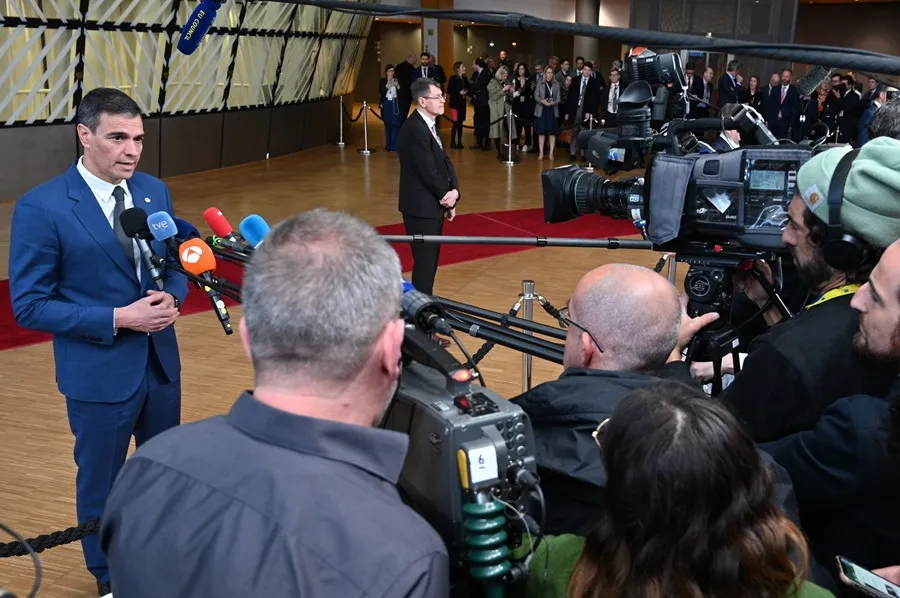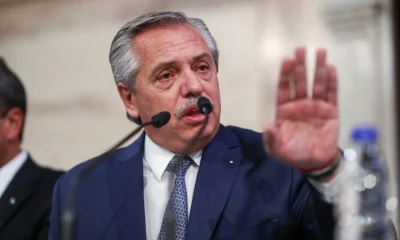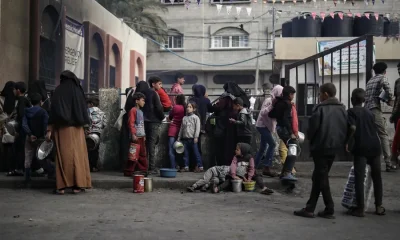International
Spain will recognize Palestine as a State in a few weeks even if other countries do not follow it

The Spanish Government will decide in the coming weeks the recognition of Palestine as a State regardless of whether or not other countries may or may not join that decision.
This is assured by sources of the Executive after the series of meetings that the President of the Government, Pedro Sánchez, is holding with other European leaders to analyze the situation in the Middle East, explain their position and try to coordinate actions in that direction.
But whether other countries join Spain’s thesis of already recognizing the Palestinian State or if they do not, the Government has already adopted a political decision and will make that recognition, as Sánchez said, before the end of this semester.
What’s more, the cited sources emphasize that the decision, which recalls that it is endorsed by a proposal approved by Congress in 2014 and has a majority endorsement of Spanish society, will be adopted in weeks more than in months.
Sánchez, who participates this Thursday in the final day of the extraordinary meeting of the European Council, has toured several EU countries to promote the recognition of the Palestinian State and has met in Brussels – on the sidelines of the summit of the Twenty-seven – with the prime ministers of Malta, Robert Abela, and Luxembourg, Luc Frieden.
With Abela there has been harmony for the recognition of Palestine, since they have ratified the commitment signed by Spain, Malta, Slovenia and Ireland on March 22 to make it a reality.
However, it has not been specified whether they will take the step together or the date for it, since they have limited themselves to emphasizing that it will be done at the time that is considered appropriate.
The situation is different in the case of Luxembourg, because there is more internal division in this regard, and in the meeting there has only been an exchange of views.
The Spanish Government insists that its decision is made regardless of what other countries do, although it would like it to be a coordinated issue.
The Executive is aware that in each country there is a different procedure and in some cases it is necessary for the decision to go through Parliament and in others, as in Spain, it is not.
Moncloa gives great relevance to the debate that will take place this Thursday in the UN Security Council on the presence of Palestine in the United Nations as a full member, a debate in which the United States is expected to veto that possibility and in which the Minister of Foreign Affairs, José Manuel Albares, will intervene in favor.
Central America
Senator Van Hollen Meets with Deported MS-13 Member in El Salvador; Trump and Bukele React

U.S. Democratic Senator Chris Van Hollen, representing the state of Maryland, held a meeting in El Salvador with deported MS-13 gang member Kilmar Ábrego García, a member of the criminal group classified by the U.S. government as a terrorist organization.
“Kilmar Ábrego García, miraculously resurrected from the ‘extermination camps’ and ‘torture chambers,’ now sipping margaritas with Senator Van Hollen in the tropical paradise of El Salvador!” wrote President Nayib Bukeleon X (formerly Twitter), sharing photos of Van Hollen, Ábrego García, and a lawyer sitting together at a Salvadoran hotel.
The deported gang member is seen wearing a plaid shirt and a flat-brimmed cap, seated at a table with glasses and coffee cups. The senator also shared images of the meeting on his own social media accounts.
Bukele reaffirmed that Ábrego will remain in El Salvador and will not be returned to the United States.
“Now that his health has been confirmed, he has earned the honor of remaining under the custody of El Salvador,” Bukele added.
Former U.S. President Donald Trump criticized the senator’s meeting with Ábrego on Truth Social, calling Van Hollen “a fool” for advocating for Ábrego’s return to the U.S.
International
Pope Francis Appears for Easter Blessing, Calls for Peace and Religious Freedom

Pope Francis, still recovering from pneumonia, appeared on the balcony of St. Peter’s Basilica in the Vatican on Easter Sunday and, with a faint voice, wished a “Happy Easter” to the thousands of faithful gathered to celebrate the Resurrection of Christ.
A month after being discharged from a lengthy hospital stay, the presence of the 88-year-old pontiff had remained uncertain, with the Vatican not confirming his attendance ahead of time.
Eventually, the pope made a brief appearance in a wheelchair shortly after 12:00 p.m. (10:00 GMT) to deliver his traditional “Urbi et Orbi” blessing (“to the city and to the world”).
Although no longer wearing an oxygen cannula, the Argentine Jesuit relied on a close aide to read his Easter message, which touched on major global conflicts.
Francis condemned the “dramatic and unworthy humanitarian crisis” in Gaza and called for a ceasefire, while also expressing concern over the “growing climate of antisemitism spreading across the globe.”
He further emphasized the importance of religious freedom and freedom of thought, stating that without mutual respect, “peace is not possible.”
International
Thousands rally nationwide against Trump’s threat to U.S. democracy

Thousands of protesters gathered on Saturday (April 19, 2025) in major cities like New York and Washington, as well as in small communities across the United States, in a second wave of demonstrations against President Donald Trump. The crowds denounced what they view as growing threats to the country’s democratic ideals.
In New York City, demonstrators of all ages rallied in front of the Public Library near Trump Tower, holding signs accusing the president of undermining democratic institutions and judicial independence.
Many protesters also criticized Trump’s hardline immigration policies, including mass deportations and raids targeting undocumented migrants.
“Democracy is in grave danger,” said Kathy Valyi, 73, the daughter of Holocaust survivors. She told AFP that the stories her parents shared about Adolf Hitler’s rise to power in 1930s Germany “are happening here now.”
In Washington, demonstrators voiced concern over what they see as Trump’s disregard for long-standing constitutional norms, such as the right to due process.
-

 International4 days ago
International4 days agoArsenal stun Real Madrid at the Bernabéu to reach Champions League semifinals
-

 Central America3 days ago
Central America3 days agoNicaraguan Exiles to Mark 7th Anniversary of 2018 Protests with Global Commemorations
-

 International3 days ago
International3 days agoDominican ‘False Hero’ Arrested for Faking Role in Nightclub Collapse That Killed 231
-

 International4 days ago
International4 days agoBogotá residents line up for yellow fever vaccine amid national alert
-

 International2 days ago
International2 days agoACLU seeks emergency court order to stop venezuelan deportations under Wartime Law
-

 International4 days ago
International4 days agoDeSantis’ immigration crackdown sparks alarm in Venezuelan Communities in Doral
-

 Central America2 days ago
Central America2 days agoUN complaint filed against Costa Rica over detention of migrant children
-

 International4 days ago
International4 days agoMexico refuses to restore ties with Ecuador while Noboa remains in office
-

 International18 hours ago
International18 hours agoThousands rally nationwide against Trump’s threat to U.S. democracy
-

 Central America39 mins ago
Central America39 mins agoSenator Van Hollen Meets with Deported MS-13 Member in El Salvador; Trump and Bukele React
-

 International41 mins ago
International41 mins agoPope Francis Appears for Easter Blessing, Calls for Peace and Religious Freedom































